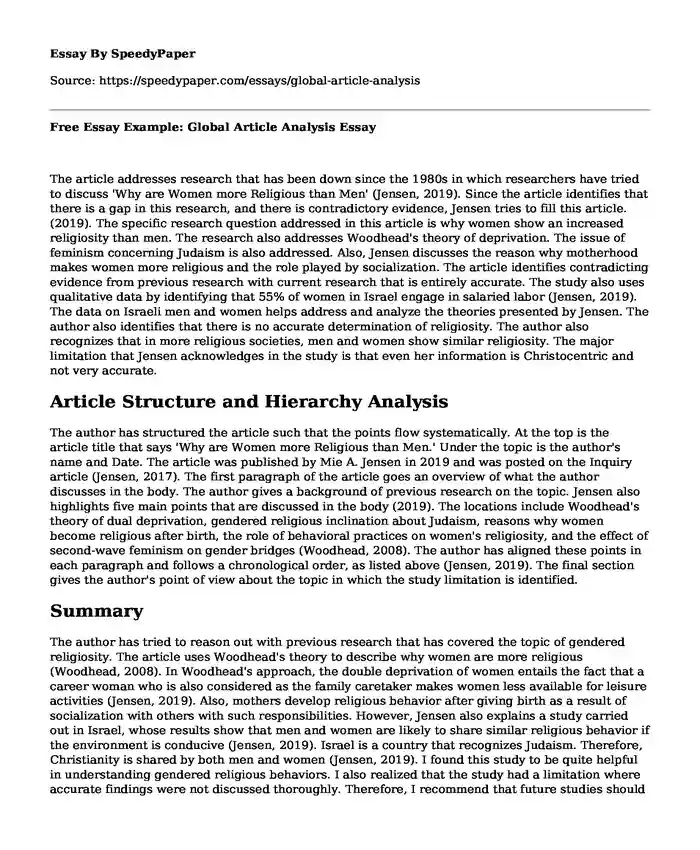
| Essay type: | Critical analysis essays |
| Categories: | Gender Religion Social issue |
| Pages: | 3 |
| Wordcount: | 633 words |
The article addresses research that has been down since the 1980s in which researchers have tried to discuss 'Why are Women more Religious than Men' (Jensen, 2019). Since the article identifies that there is a gap in this research, and there is contradictory evidence, Jensen tries to fill this article. (2019). The specific research question addressed in this article is why women show an increased religiosity than men. The research also addresses Woodhead's theory of deprivation. The issue of feminism concerning Judaism is also addressed. Also, Jensen discusses the reason why motherhood makes women more religious and the role played by socialization. The article identifies contradicting evidence from previous research with current research that is entirely accurate. The study also uses qualitative data by identifying that 55% of women in Israel engage in salaried labor (Jensen, 2019). The data on Israeli men and women helps address and analyze the theories presented by Jensen. The author also identifies that there is no accurate determination of religiosity. The author also recognizes that in more religious societies, men and women show similar religiosity. The major limitation that Jensen acknowledges in the study is that even her information is Christocentric and not very accurate.
Article Structure and Hierarchy Analysis
The author has structured the article such that the points flow systematically. At the top is the article title that says 'Why are Women more Religious than Men.' Under the topic is the author's name and Date. The article was published by Mie A. Jensen in 2019 and was posted on the Inquiry article (Jensen, 2017). The first paragraph of the article goes an overview of what the author discusses in the body. The author gives a background of previous research on the topic. Jensen also highlights five main points that are discussed in the body (2019). The locations include Woodhead's theory of dual deprivation, gendered religious inclination about Judaism, reasons why women become religious after birth, the role of behavioral practices on women's religiosity, and the effect of second-wave feminism on gender bridges (Woodhead, 2008). The author has aligned these points in each paragraph and follows a chronological order, as listed above (Jensen, 2019). The final section gives the author's point of view about the topic in which the study limitation is identified.
Summary
The author has tried to reason out with previous research that has covered the topic of gendered religiosity. The article uses Woodhead's theory to describe why women are more religious (Woodhead, 2008). In Woodhead's approach, the double deprivation of women entails the fact that a career woman who is also considered as the family caretaker makes women less available for leisure activities (Jensen, 2019). Also, mothers develop religious behavior after giving birth as a result of socialization with others with such responsibilities. However, Jensen also explains a study carried out in Israel, whose results show that men and women are likely to share similar religious behavior if the environment is conducive (Jensen, 2019). Israel is a country that recognizes Judaism. Therefore, Christianity is shared by both men and women (Jensen, 2019). I found this study to be quite helpful in understanding gendered religious behaviors. I also realized that the study had a limitation where accurate findings were not discussed thoroughly. Therefore, I recommend that future studies should focus on addressing this topic from the surroundings of each society and the roles played by either gender.
References
Jensen, M. A. (2019). Why Are Women More Religious than Men?. Inquiries Journal, 11(10). http://www.inquiriesjournal.com/articles/1770/why-are-women-more-religious-than-men
Woodhead, L. (2008). 'Because I'm worth it': Religion and women's changing lives in the West. Women and religion in the West: Challenging secularization, 147-161. https://books.google.com/books?hl=en&lr=&id=5fyNCwAAQBAJ&oi=fnd&pg=PA147&dq=Woodhead+theory+of+double+deprivation+2007&ots=aJrO8lWBec&sig=U93MHepo6vRweEqWKn5qI8sTCY8
Cite this page
Free Essay Example: Global Article Analysis. (2023, Nov 14). Retrieved from https://speedypaper.com/essays/global-article-analysis
Request Removal
If you are the original author of this essay and no longer wish to have it published on the SpeedyPaper website, please click below to request its removal:
- Free Essay Sample on Feminism and Jane Austen
- V for Vendetta - Movie Review Essay Example
- Free Essay on the Inequality by Way of Income and Discrimination in the United States
- Essay Example: Gender Difference in Treatment of Major Depression Disorder
- A Courageous Tubman - Free Essay Sample
- Article Analysis Essay on Incumbency, National Conditions, and the 2012 Presidential Election
- Corrective Action - Paper Sample
Popular categories




